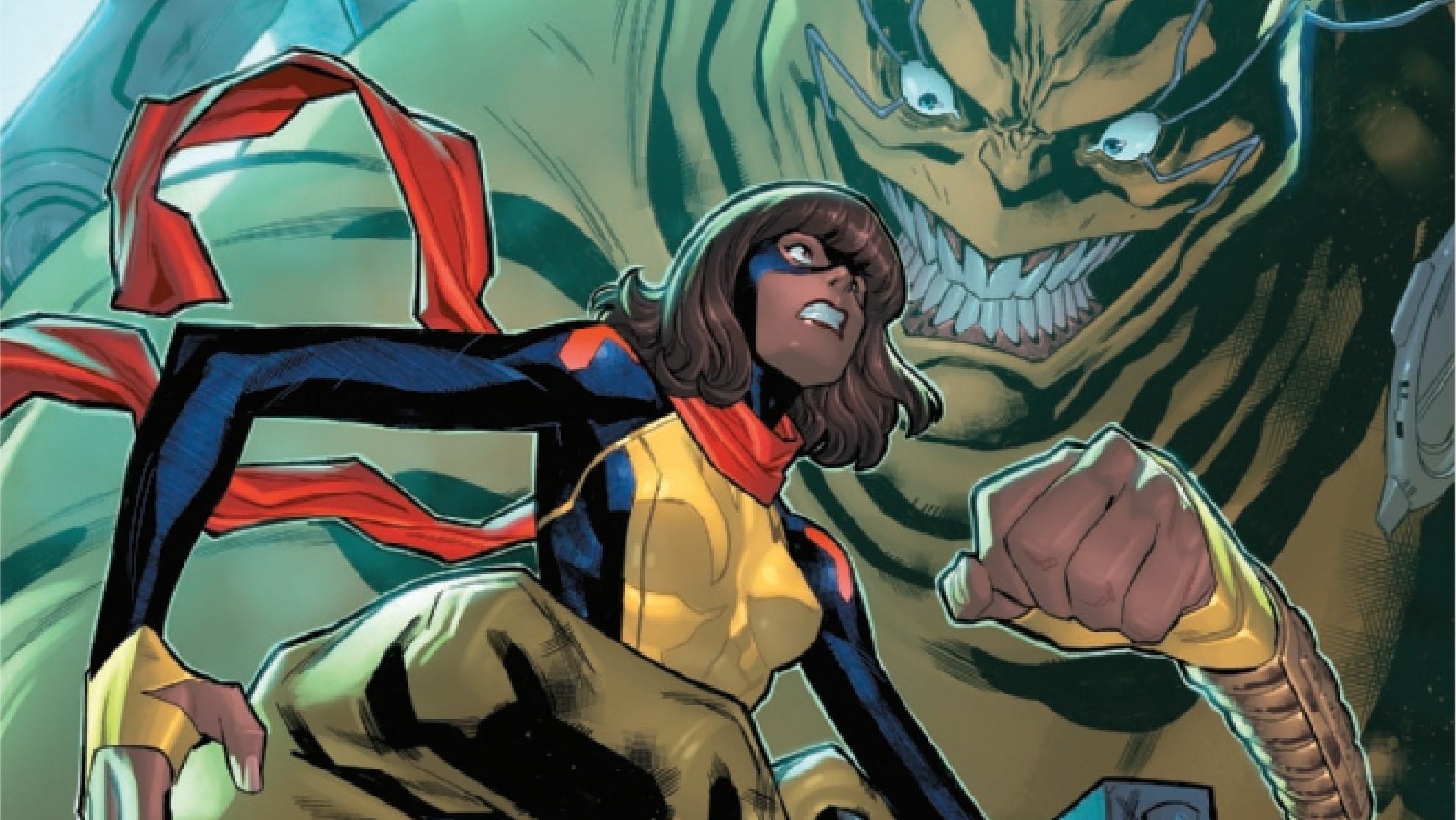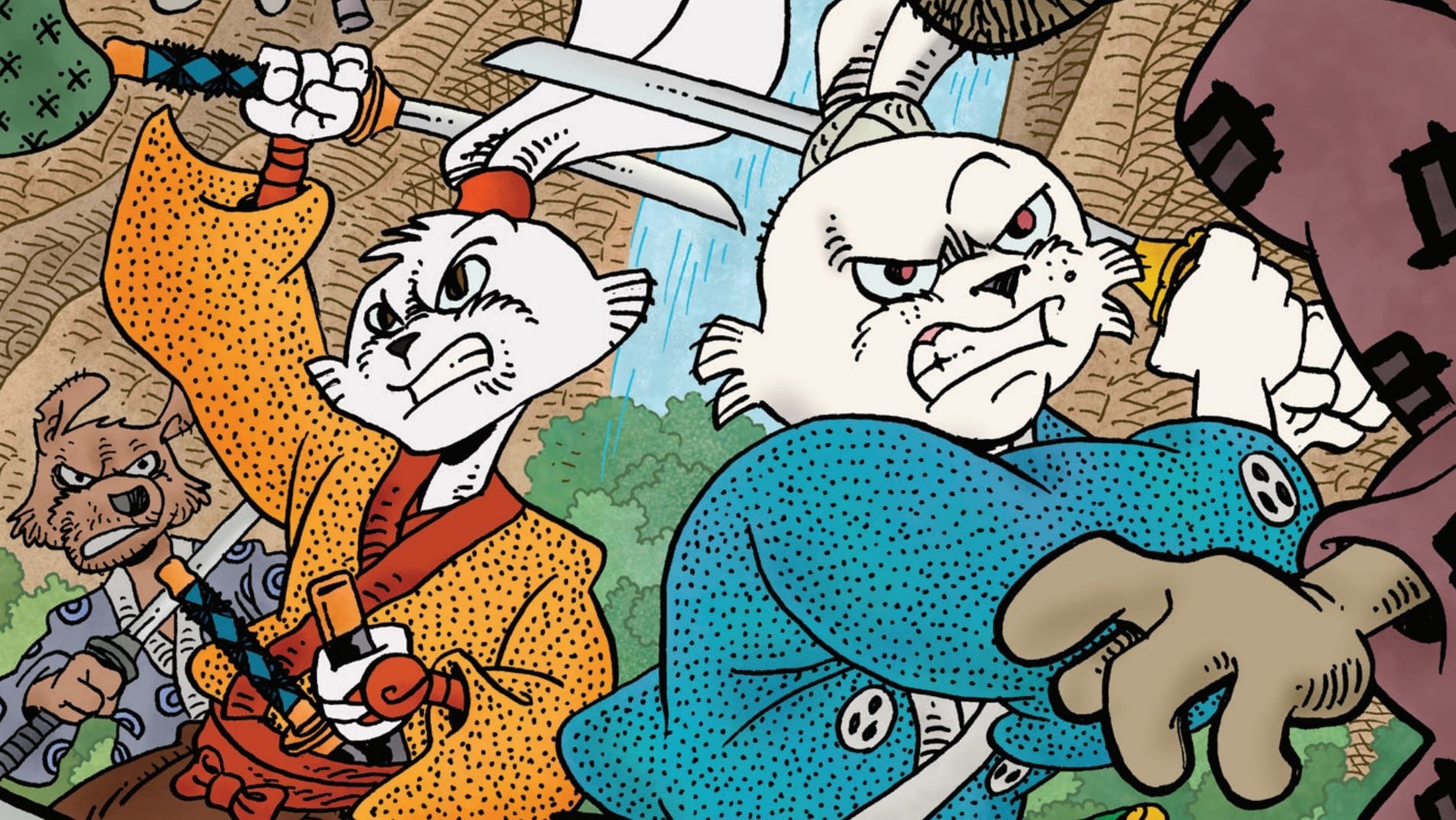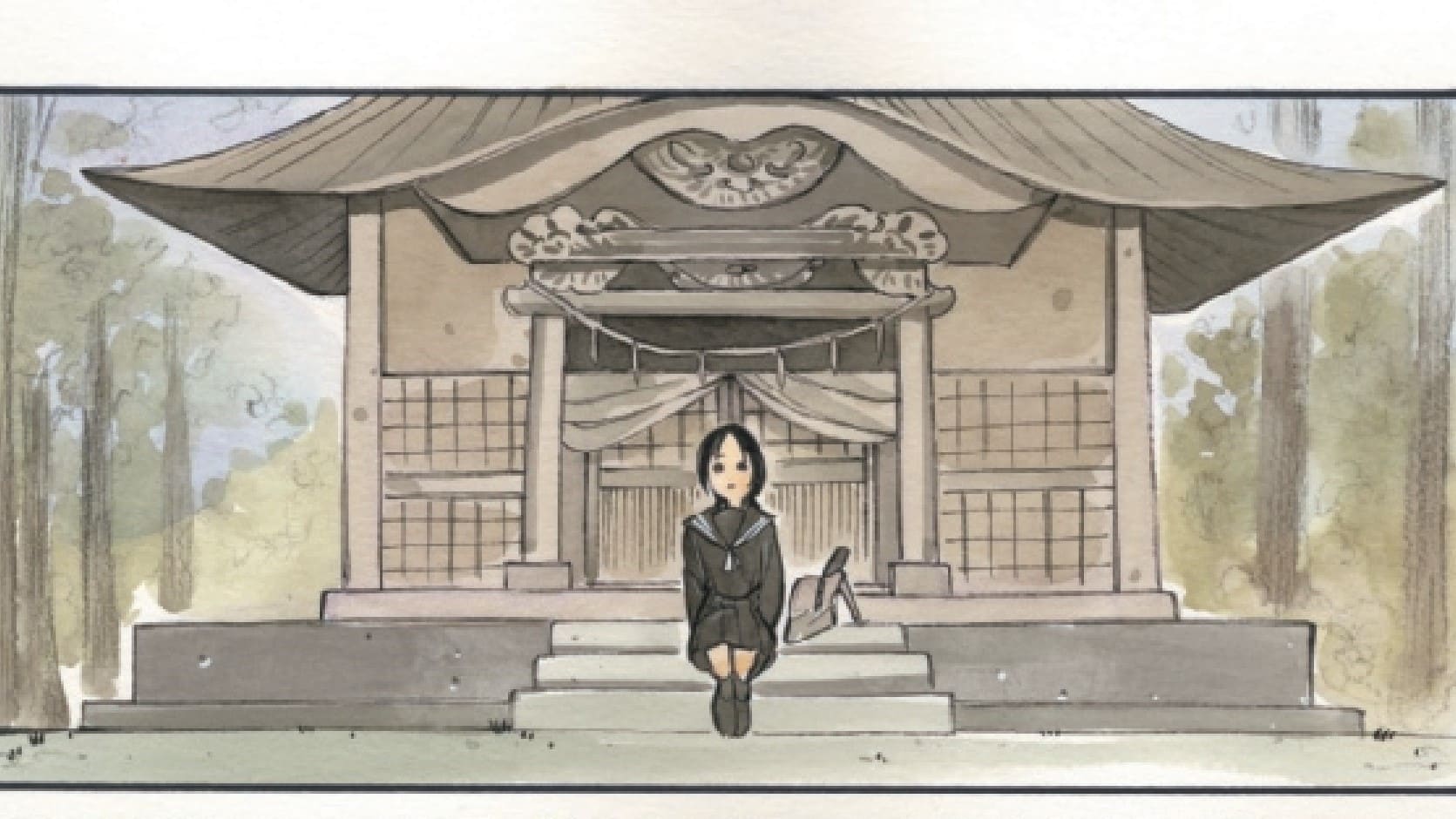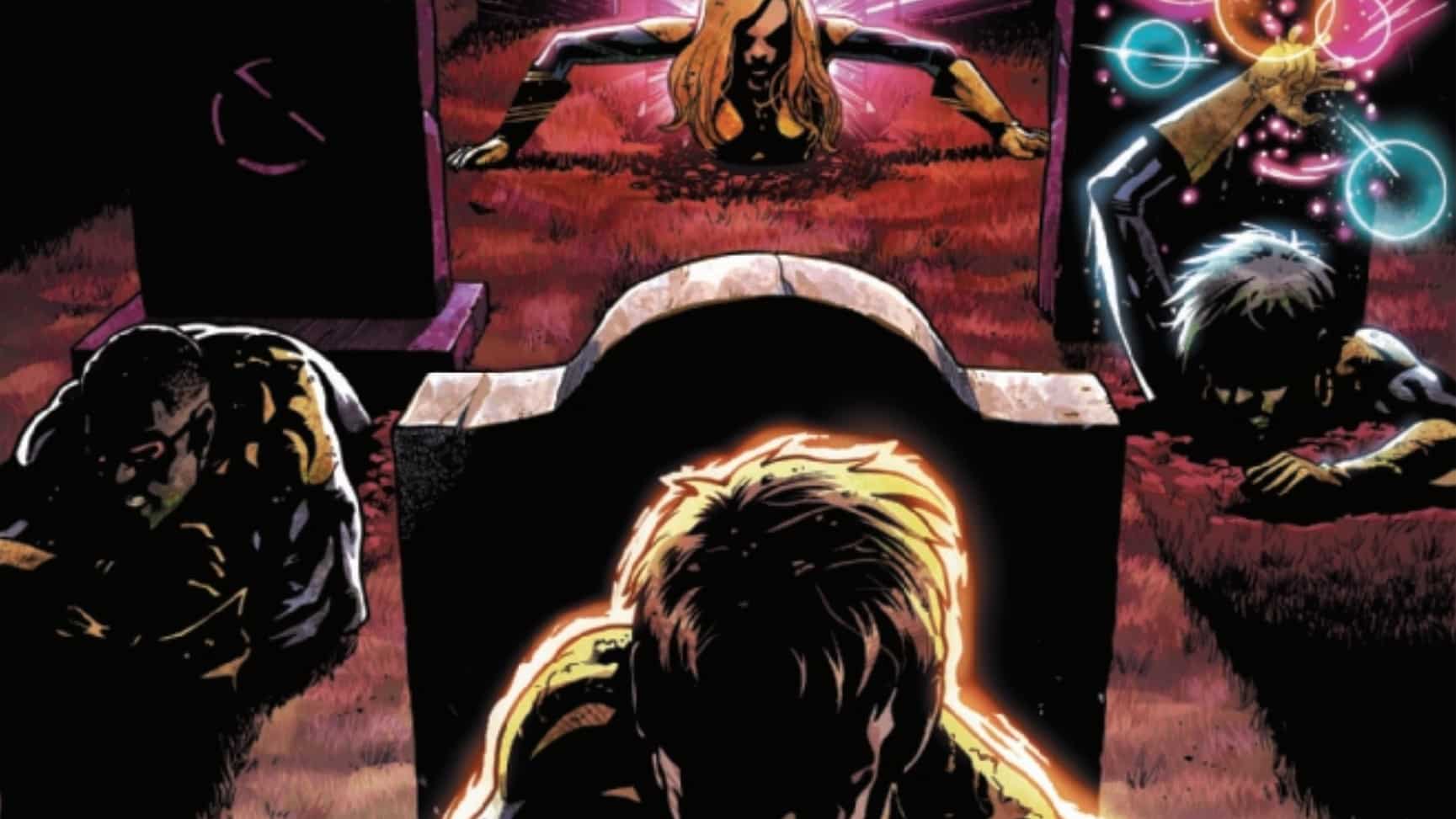The cat’s out of the bag — or the djinn out of the lamp. Kamala’s no alien, Asgardian, or even Inhuman, it turns out her legacy’s a lot more complicated than that. When a group of djinn known as the ClanDestine ask for Kamala’s help to go home, Kamala has a big decision to make. Only problem? The djinn aren’t really asking.
Armaan Babu: So there are some…choices, being made with this show, and one of the big ones this episode is certainly not one I was expecting — nor is it one I know entirely how I feel about. I’m glad I get to talk this out with someone, and am pleased to have my She-Hulk co-reviewer joining me this episode to talk about it! But first — Stephanie, what are your thoughts about this series so far?
Stephanie Burt: Those thoughts have changed, and not in a good way. Two episodes in I was loving almost all of it: the pacing, the acting (especially Iman Vellani! who’s still doing all she can), and especially the changes they’ve made from the comics (which I have read and reread and now teach): the powers that had to change to look good on live TV, the internal mosque politics involving Nakia (which haven’t been on US TV before) played up to overshadow the high school popularity subplots (which are on US TV eight days a week). I was pumped for this series. Now… um.
ClanDestine Djinn-etics

Armaan: Last week ended on an intriguing cliffhanger, with the appearance of Nadja — the lady who’s been appearing to Kamala in visions, and who is apparently Kamran’s mom. This episode wastes no time in letting us know just what’s up: Nadja and her companions – who included Kamala’s great-grandmother Aisha – are a group known as the ClanDestine, who come from another dimension. They’re technically aliens, but they’ve been around long enough to insert themselves into myth…as the djinn.
Now, I don’t know a lot about ClanDestine myself, Stephanie — do you? We don’t get a lot of time with them, but I was kind of charmed by the camaraderie they had, played off as babble in the background.
Stephanie: I know about ClanDestine because they intersect with the X-Men! They were created by Alan Davis for a short-lived 1990s series and a two-issue crossover mini. The comics ClanDestine (who are, like this one, multiracial) are so long lived they might as well be immortal, they’re led by a guy named Adam (on TV, Aadam), they all have powers, and they live in deliberate, well-defended obscurity, except for two bright and cheerful teens who want to be superheroes!
This week’s TV show merges those teens with Kamran from the comics, who in the comics storyline (“Crushed”) is… well, let’s say you wouldn’t want to date him. And I will now give the mic to Armaan, who has thoughts.
Armaan: Now, I care very little about ClanDestine — especially as from what I can tell, what we’re given here has so little to do with the comics version that it might as well be an entirely new thing. What does matter to me is that they changed Ms. Marvel’s origin from being Inhuman based to being djinn-based.
I have thoughts.
As a show, Ms. Marvel is making a lot of big choices in terms of changing things from the comic, and doing very little in terms of explaining why those choices were made, leaving us to do the guesswork. I can only guess that blue-purple-pink hard light powers are easier to animate than big stretchy powers. I can only speculate about why Nakia’s background was changed – something that’s been bothering critics and viewers alike – and I cannot say, with any kind of certainty, who was responsible for the choice to make Marvel’s only Muslim superhero part djin, or why they decided to do so.
I can certainly understand why Marvel might want to distance themselves from her Inhuman origin, given how badly that show flopped, but what this new origin feels like is putting a cultural hat on a hat. I don’t see the need to tie Ms. Marvel’s powers into myths from her cultural heritage. American heroes don’t have this — Spider-Man isn’t pulling from classic American folk tales about spiders (…are there any?), Tony Stark was never inspired by an old legend of American ingenuity, Captain America’s origin springs from no cultural myth, and his superhero name is Captain America.
On the other hand, one could argue that when it comes to traditional folklore and mythology, America’s a little bereft. From what I can tell, any semblance of culture America has filters out anything that isn’t white, hetero, or Christian, repackages what’s left to be as safely (and arbitrarily) “family friendly” as possible, and further milk those stories for every buck they’re worth until everyone’s tired of them and moves on to the next novel franchise. This brings me to the thing that actually bothers me:
There’s no magic to these djinn.
I’m not surprised — the MCU hates magic. Asgard is introduced as a realm that’s just so technologically advanced that everything they do only looks like magic. Doctor Strange shies away from eldritch sorcery, and instead leans into more traditionally sci-fi stuff, like time travel, mirror dimensions and multiverses. Remember when Agents of SHIELD got into trouble for suggesting that Vishnu may have just been a blue-skinned alien? True magic, apparently, isn’t family friendly anymore — or maybe the MCU just wants to filter out anything it isn’t able to completely understand.
These djinn come from an alternate dimension, and would, under normal circumstances, be able to manipulate hard light the way Ms. Marvel does. Oh, sure, they call it Noor (literally “light” in Arabic) like dressing something up in an exotic sounding name makes it more spiritual, but at the end of the day all we’re getting is science fiction hard-light and a few unexplained visions. The djinn, however, don’t even have that — they simply age slower, and have collapsible weaponry they’re all proficient with, adding them to the increasingly long list of immortals that have been hiding in secret in the MCU for hundreds of years.
There’s nothing compelling about the djinn. Granted, there was never anything compelling about Ms. Marvel being Inhuman, either, but at least when she was Inhuman it didn’t feel like writers were trying to give her cheap cultural flavoring with none of the spice.
Stephanie: Ding ding ding! If Amanat, Wilson, Miyazawa and company had created comics Kamala five years before or after they did she would have been a mutant, or got her powers through a lab accident like Spidey. The Push-the-Inhumans era at Marvel is over and I do not miss it one Attilan bit, or whatever the Inhumans used for currency. I don’t mind a genetic extrahuman origin for Kamala’s powers, which aren’t (and I think should not be) magical, and when I saw the blue hand in the dust with the bangle I figured she’d turn out to be part Kree, like her role model Carol.
I still think part Kree would have been a better choice, and I agree that calling her family djinn is (a) silly since these djinn are not magical and (b) putting a hat on a cultural hat. MCU djinn are, for now, just another species of powerful aliens some of whom live on Earth (joining the Kree, the Skrull, the Eternals and Deviants, and the Asgardians, so far). They’re not anything. And “there’s a whole branch of your South Asian family coming to get you and use you” makes the bad guys Global South types and the good guys (including the British-accented Kamran) Westernized, something the comic took care never to do.
I do think there’s magic in the MCU where Dr. Strange is involved– what he does never feels like science to me– but there’s also a storytelling headache where Dr. Strange is involved, since the thing about magic (especially magic with no strong folkloric or mythic tradition behind it) is that no one can say how it works! I don’t mind the absence of magic in Ms. Marvel nor its confinement to a handful of top-tier heroes and villains (Dr. Strange, Wong, Loki) in the MCU. But I’m with you entirely on “why djinn?”
Armaan: Now, we’re three episodes in to a six episode series, and it looks like we’re taking the scenic route towards superheroism: after her first rescue attempt nearly ended up in a kid’s death, Kamala’s starting to wonder whether being a superhero is really all cracked up to be — whether her choices are causing more harm than good.
I think it’s an interesting place to take the story. It shows how much Kamala truly cares, not just about herself, but about the people around her. As much as a dreamer as she’s apparently been her whole life, great responsibility is now being thrust upon her shoulders, and sometimes, the choice not to use great power can be just as helpful as the choice to use it.
Stephanie: That’s right, and I like where the script is taking her character. She’s gone from fangirl to brooder much faster than I expected– as fast as Peter Parker, whom she certainly resembles, though not as much as Matt Linz’s’s portrayal of Bruno resembles Tom Holland’s for Spider-Man. And she’s a superhero who had to live in two worlds (her immigrant family and her very American high school) or maybe three (her life as a fan, her school life and her home life) even before she acquired great power and great responsibilities. You can see the conflicts on her face. She’ll have to come out to her parents soon, I’m pretty sure: she’s too close to them, and they’re too close to her, to keep the secret going for long.
So yeah, I love where Kamala’s going emotionally. There’s a lot I don’t love this time out, though. Especially the pacing. As Mara Hampson (with whom I watched the episode: she’s written for ComicsXF too) said, “It feels like this episode got hit with the exposition fairy.” Partition itself (which absolutely needed an explanation for Americans) got explained in episode 2, but now there’s explanation for ClanDestine and the bangle and then there’s Slow Camera Work Fit for Prestige TV and it all takes too long for a superhero show. Or any show, given how predictable these beats are.
The Wedding Party

Armaan: Between her community being investigated by Damage Control, and her own mistakes putting other people at risk, Kamala seems to be caught between her dreams, and the good of her community. It’s not an uncommon struggle, especially for a child raised by somewhat conservative parents in a tight-knit Muslim community. What I appreciate here is that this isn’t a struggle that Kamala’s entirely forced into — her doubts here might have been influenced by the way she was raised, but she’s come to them on her own.
Stephanie: She loves her parents and has no wish to repudiate her culture but she won’t let either of them tell her what to do. Her decisions are hers. And they’re tough decisions. Nor are they confined to the children of immigrants: “Am I serving others in need by pursuing my dreams, or am I making a selfish choice?” feels very familiar to anybody who’s ever wondered if we should be writers, or artists, or anything else that might come with, well, fame.
Armaan: Yeah, that’s something I noticed right in episode one, and I feel like it’s one of the most relatable things about her character!
Now, the djinn may have been a disappointment, but we’re getting a real whirlwind tour of cultural celebration here. From last week’s Eid celebration to a mehendi, to a wedding itself, to – spoilers for an episode I hope everyone’s watched before reading this in-depth review! – a trip to Karachi itself coming up! A real tumultuous time for Kamala even without the addition of superpowered whatnot.
There are moments in the comics where a distressed, exhausted or confused Kamala gets comfort from her family, wisdom, and advice, and I’m glad to see that the show is making the time for that here. There were some really lovely scenes with the Khan family this episode — did you have any favorites?
Stephanie: Everything with Aamir. He feels so real: he wants to be serious and scholarly and a good partner and he loves his fiancee so much and he has no idea how he’ll earn a living. He’s a trope from Jewish immigrant culture too, by the way. He’s fun to watch. And I don’t love the two-boys-fighting-over-a-girl rivalry between Bruno and Kamran, but I do love the way Kamran keeps getting Bruno’s name wrong, reversing the garbage moments (which keep happening IRL) where white people just don’t try to learn nonwhite names.
Armaan: This comes a little bit after the mehendi, but the scene with Kamala and her mom meant a lot to me. This show does a lot to show that Kamala’s parents aren’t just the stereotypical ban-everything-but-schoolwork-and-marriage kind of parents. They are worried about Kamala, they care for here, and they’re their to strengthen her. It says a lot that Kamala leans on her mom when she’s troubled — there’s a strong relationship their, despite the secret Kamala’s keeping, and it was such a beautiful, comforting scene between them.
Stephanie: My other favorite wedding party moments involved Brown Jovi– the second “South Asian culture adapts Western music” act this show has brought in, by the way, after the very real Swet Shop Boys! The real Bon Jovi– who would be very familiar to Boomers and Gen Xers on the dance floor, maybe not so much to Kamala– retain a strong association with New Jersey, and their hits just stick in the mind, so I was hoping and expecting a Bon Jovi song when the action broke out. “Living on a Prayer” answered my…. you know..
Armaan: It was a real shot through the heart, alright!
Djinni on the Dance Floor

Stephanie: The first two episodes’ pacing, their way of interweaving teen angst and family drama and exposition and superhero action, hit so hard and so well that I missed them intensely by the time the fight at the wedding broke out. The fight itself: uh.
Armaan: I gotta say — they go from zero to villainy pretty quick, don’t they? One second-hand text about how Kamala might want to wait a little bit to make sure it’s safe, and they’re suddenly all in on a public wedding attack. It’s extremely forced villainy, especially as the fight itself was a little lacklustre.
Stephanie: I guess ClanDestine (or the Clandestines) don’t have powers in this dimension (you have to be part human to do that), so they use weapons familiar from video games, each clan member with her own weapon. Convenient that they’re all super-physically fit! I guess they’ve been training for this moment. Or else being djinn makes them physically super-fit. But then why wouldn’t it give them powers? Comics ClanDestine have beautifully rendered powers– they would, they’re drawn by Alan Davis, seriously, go check out their X-Men crossover! But powers like that cost money on TV, and each one’s a risk. So we get Kamala and her still-new glowing-blue energy-extension powers against a set of adult martial arts types, interrupted by Kamran and Bruno, who prove just distracting enough that Kamala can hold on until the evil feds show up and take ClanDestine (or the Clandestines) into custody.
Damage Control in the MCU has nothing to do with Damage Control in the comics any more, though they did in Spidey: Homecoming. MCU Damage Control feel more like something you’d see in an old issue of X-Factor: government types who want to corral superhumans. Especially brown superhumans. There’s nothing good about them. What happened to Zoë?
Armaan: I have a feeling that Zoë’s going to be just fine — it’s the Muslim community who arein trouble.
Stephanie: Anyway, it’s a fine fight scene for what it is– exciting, with tables and chairs in motion. And it tees up my favorite emotional moment, late in the show: Nakia has a history of telling Kamala everything, absolutely everything, about her life, as far as we know. But Kamala came into a big secret or two, and did she tell Nakia? Nope. She let Nakia find out. I’d be hurt. So’s she. Armaan?
Armaan: I’ll say this — TV Kamala let Nakia in on the secret a lot faster than comics Kamala did. We even saw her try to tell Nakia, earlier in the episode, but understandably didn’t want to steal Nakia’s thunder just as Nakia got elected to the board, and showed down Damage Control pretty well besides.
To go back for just a second — that scene with Damage Control walking into the mosque with their shoes on? That was hard to watch. The show’s makers knew it would be hard to watch, for those who know — you just do not bring your shoes into the mosque. That’s just not done. As if we needed any more reason to hate Damage Control.
Stephanie: I’m trying to keep myself from comparing the choices this show makes to the choices in the comics, except where I want to defend the show (as with Kamala’s power set). But. We haven’t seen very much of Jersey City, the town that Ms. Marvel supposedly defends, the geographic source of her identity, even more than Pakistan can be. We have seen no local bad guys, only ClanDestine (or the Clandestines) and Damage Control. And we’re probably headed to Karachi, a trip that the comics take only after (checks longbox) thirty issues set in Jersey City (with a few trips to New York) had gone by (yes, thirty, not twelve: the comics restart with a new no. 1 after no. 18, shrug emoji).
Kamala’s not from Karachi. She’s from North Jersey. I want to watch a show about a second-gen teen from North Jersey, her friends, her religious community, and her well-intentioned family, not yet another intergenerational saga of super-powered adults with mostly bad intentions except for the one who turns good (the “good Muslim”??? surely they’re not gonna go there) fighting the evil US government. I want to see more of Bruno, Nakia and Zoë, who presumably are not coming to Pakistan. And I want more of the mosque drama (which frankly reminds me of my father’s shul), which takes place in Jersey City. If we go to Karachi next episode, and I think we will, I hope we get home soon.
Or else I hope the showrunners exceed my expectations and make a superb MCU story set in a real country (not Madripoor, not Wakanda) other than the UK and US. Have they done so before?
Armaan: Moon Knight took us on a fun trip through Cairo, and I don’t think I heard a lot of complaints there! Marvel did play it pretty safe on that trip, though, spending a lot of its time in fictional tombs or out in the desert, or the afterlife. I have a feeling that we’re going to get something similar here — a few establishing shots of Karachi, with most of the action taking place in and around that temple we saw in the flashback.
The thing that bothers me most is that Ms. Marvel has a pretty great supporting cast. Is Kamala bringing all of them to Karachi? Or is she leaving them behind to focus on the superhero part of her story? I like tying in her legacy to her Ms. Marvel origin story, but if we’re dropping all best bits of the show, I’m going to be disappointed, too. I hope we see her back in Jersey before too long!
Marvel-ous Ms.-cellany
- Ms. Marvel co-creator, Sana Amanat, had a blink-and-you’ll-miss-it cameo at the wedding.
- Bruno maybe be the least interesting character on the show, but the worry and concern he shows for Kamala elevate his performance. Same for Kamala’s mom, and she was already great!
- Eagle-eyed viewers will have noticed the symbol of the ten rings — that’s right, of Shang-Chi fame — on the floor of the ruins shown in the flashback. Asian wristwear in the MCU is no joke.
- ”Good isn’t a thing you are. It’s a thing you do.” Good line, and at this point it’s strongly associated with MCU heroes, but it didn’t start in Marvel scripts: I remember seeing it in reference to journalism like ten years ago, and if you zip through enough Marvel quotations in a standard web search you get “Ally isn’t a thing you are, it’s a thing you do” (2013) Anyone want to do a “Standing on the shoulders of giants” style history?
- I do remember that the line was intended to be Ms. Marvel’s version of “With great power must come great responsibility”, but I don’t know how well that ever really caught on.
- The dancing was great — recognizably both cringe and awesome in the way only rehearsed family wedding dances can be.
- The dance also brought us the return of the Chotta (small) Hulk, worn by Tyesha’s younger brother.
- Everyone’s worried about Kamala Khan. So are we.







